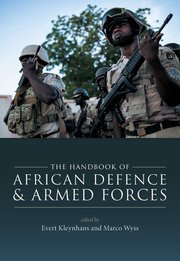Abdel-Fattah Mady, "Egypt," in The Oxford Handbook of African Defence and Armed Forces


Editors:
Evert Kleynhans, Associate Professor, Department of Military History, Stellenbosch University
Marco Wyss, Professor of International History and Security, Department of History, Lancaster University
(Oxford University Press, April 2025).
ISBN: 9780198884668
Offers an in-depth presentation and analysis of defence and armed forces in Africa
Provides African perspectives on international security and defence
Focuses on the national level of armed forces and defence policies to better understand sub-regional and regional issues
Table of Contents:
Introduction
Part I. National Defence Policies
A. North Africa
1:Egypt, Abdel-Fattah Mady
2:Algeria, Abdelkrim Dekhakhena
3:Libya and Tunisia, Derek Lutterbeck
4:Mauritania, Morocco, and Sahrawi Arab Democratic Republic, Saïd Haddad
B. Eastern Africa
5:Ethiopia, Christopher Clapham
6:Kenya, Henrik Laugesen
7:Tanzania and Uganda, Kasaija Phillip Apuuli
8:Rwanda and Burundi, Marco Jowell
9:Sudan and South Sudan, Brian Adeba and Jihad Mashamoun
10:Eritrea, Djibouti, and Somalia, Sonia Le Gouriellec
C. Central Africa
11:Democratic Republic of Congo, Jean-Jacques Wondo Omanyundu
12:Cameroon, Central African Republic, and Chad, Ketil Fred Hansen, Manu Lekunze, and Tim Glawion
13:Gabon, Republic of Congo, and Equatorial Guinea, Olaf Bachmann and Catherine Guicherd
D. Western Africa
14:Nigeria, Timothy Stapleton
15:Burkina Faso and Côte d'Ivoire, Arthur Banga
16:Mali and Niger, Marc-André Boisvert
17:Ghana, Togo, and Benin, Naila Salihu and Kwesi Aning
18:Guinea and Guinea-Bissau, Mamadou D. Bah
19:Senegal and the Gambia, Maggie Dwyer and Jahara Matisek
20:Liberia and Sierra Leone, Osman Gbla
E. Southern Africa
21:South Africa, Evert Jordaan and Abel Esterhuyse
22:Angola, Pedro Seabra and Vasco Martins
23:Zimbabwe and Mozambique, Enock Ndawana
24:Botswana and Namibia, Bafumiki Mocheregwa
25:Malawi and Zambia, Lee M. Habasonda
26:Eswatini and Lesotho, Pherudi Mokeke and Bheki Dlamini
Part II. Sub-Regional, Regional, and International Organizations
27:African Union, Dêlidji Eric Degila and Mustapha Osman Elamin
28:East African Community, Thomas Mandrup
29:Economic Community of West African States, Victor Adetula
30:Southern African Development Community, Anthoni van Nieuwkerk
31:United Nations, Niagalé Bagayoko and Nina Wilén
32:European Union, Gorm Rye Olsen
Part III. Security Challenges and Strategic Responses
33:Interstate Conflict, Lansana Gberie
34:State Failure and Civil Wars, Akali Omeni
35:Peacekeeping, Malte Brosig
36:Terrorism, Usman A. Tar and Sasilkar Banu
37:Transnational Crime, Adewunmi Falode and Babajimi O. Faseke
38:Maritime Security, Francois Vrey and Mark Blaine
39:Intelligence, Ryan Shaffer
40:Cyber Warfare, Jabu Mtsweni and Mphahlele Thaba
41:Natural Resources and Environmental Security, Damilola Olawuyi
42:Commercial Military Actors, Ulrich Petersohn
Description:
The Handbook of African Defence and Armed Forces provides the first in-depth and multifaceted analysis of the evolution and current state of national defence policies, strategies, doctrines, capabilities, security challenges, and strategic responses of African states and their armed forces. Geographically, these aspects are investigated at the national, sub-regional, and regional levels. Chronologically, they are analysed against the backdrop of the 'superpower withdrawal' from the continent in the 1990s, and the so-called 'New Scramble for Africa', which has seen a crescendo of renewed great power interest in the continent's resources, as well as its strategic role, location, and relevance since the 2000s.
The book takes a bottom-up and African-centric approach, and is organized around five key themes: i) the differing security outlooks and defence policies of African powers within the region and the different sub-regions; ii) the strategies, doctrines, transformation, and employment of African armed forces; iii) the relationship between African armed forces with sub-regional, regional, and international organizations; iv) the challenges that African states and their armed forces have been facing and their strategic responses; and v) the position of African perspectives and agency in the context of continental and international security and defence. Understanding African security and defence, especially in terms of each individual nation's ability to contribute to peacekeeping operations, counterterrorism, border security, and internal security requires a focus on the national level of armed forces and defence policies; this in turns sheds light on sub-regional and regional divergences, challenges, and cooperation. Based on this framework, the chapters in this volume offer comprehensive African perspectives on African and international security and defence, and in doing so show the agency of the continent's countries and armed forces in International Security and Relations.
Chapter 1: Egypt, Abdel-Fattah Mady
Abstract
In the mid-1970s, Egypt's defense policy shifted from countering external threats, primarily Israel, to prioritizing internal security and strengthening the army's economic and developmental contributions. This shift coincided with a shift within the regime towards strengthening ties with the US and establishing peace with Israel. The post-Cold War era and war on terror further solidified this transformation, despite retaining emphasis on armament and training for conventional warfare. However, since 2013, a further shift has become apparent. Emphasis has landed squarely on internal threats, leading to altered force structures and a heavy focus on anti-terrorism training. Under the banner of preserving the state and armed forces unity, the army has been intensely involved in suppressing opposition to the regime, broadening its internal security functions, and enlarging the military economy. At the same time, it has been strengthening the peace and near-alliance with Israel. From 2019 onward, the armed forces have embraced an elevated constitutional role— protecting the state, constitution, and democracy. This juggling of responsibilities highlights a concerning trend in Egypt: military distraction or the diffusion of the military's focus. This distraction significantly hinders the armed forces' ability to fulfill their core duties, ultimately posing a threat to national security.
© 2007- 2026. All rights reserved. Abdel-Fattah Mady عبد الفتاح ماضي
